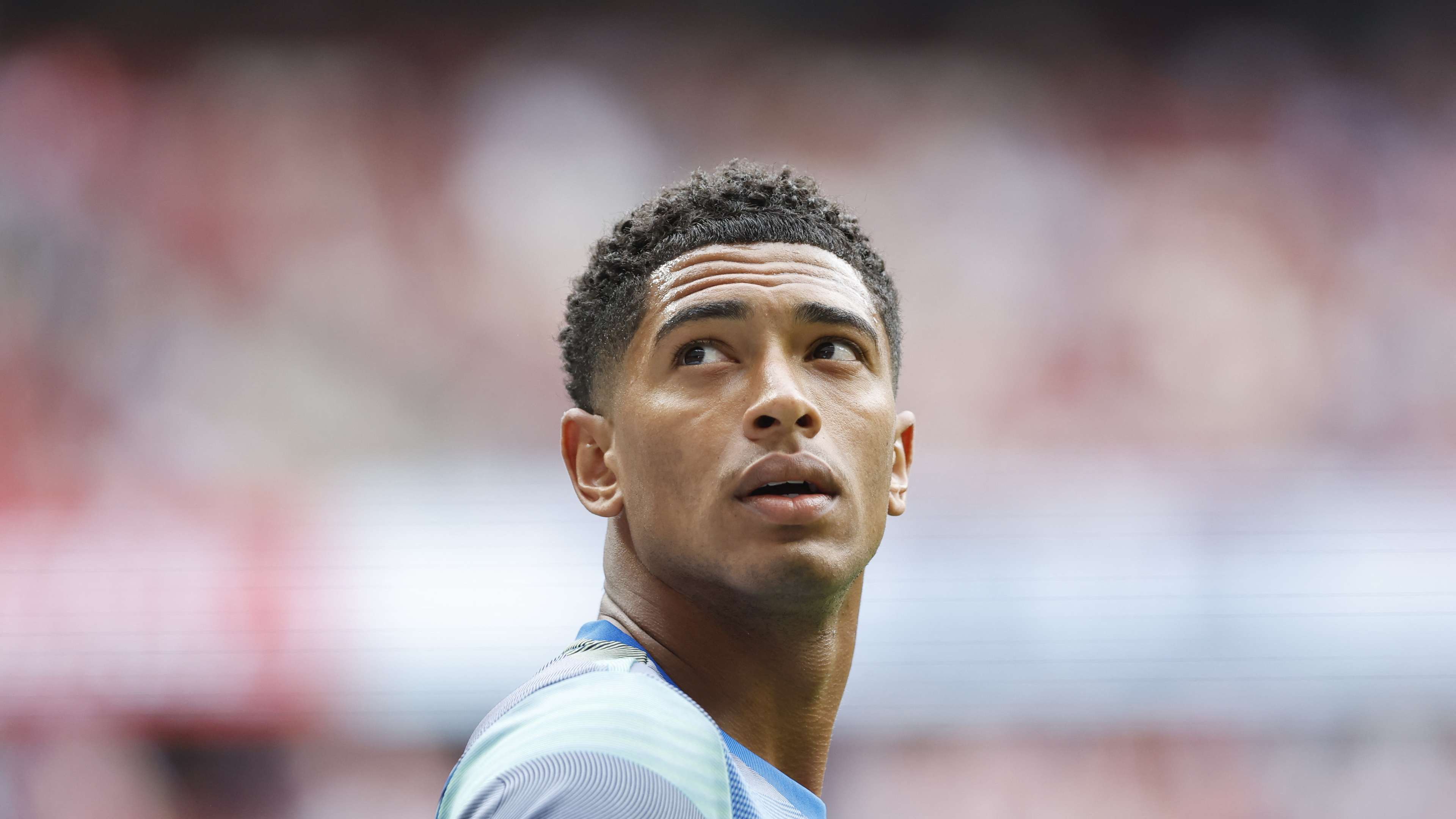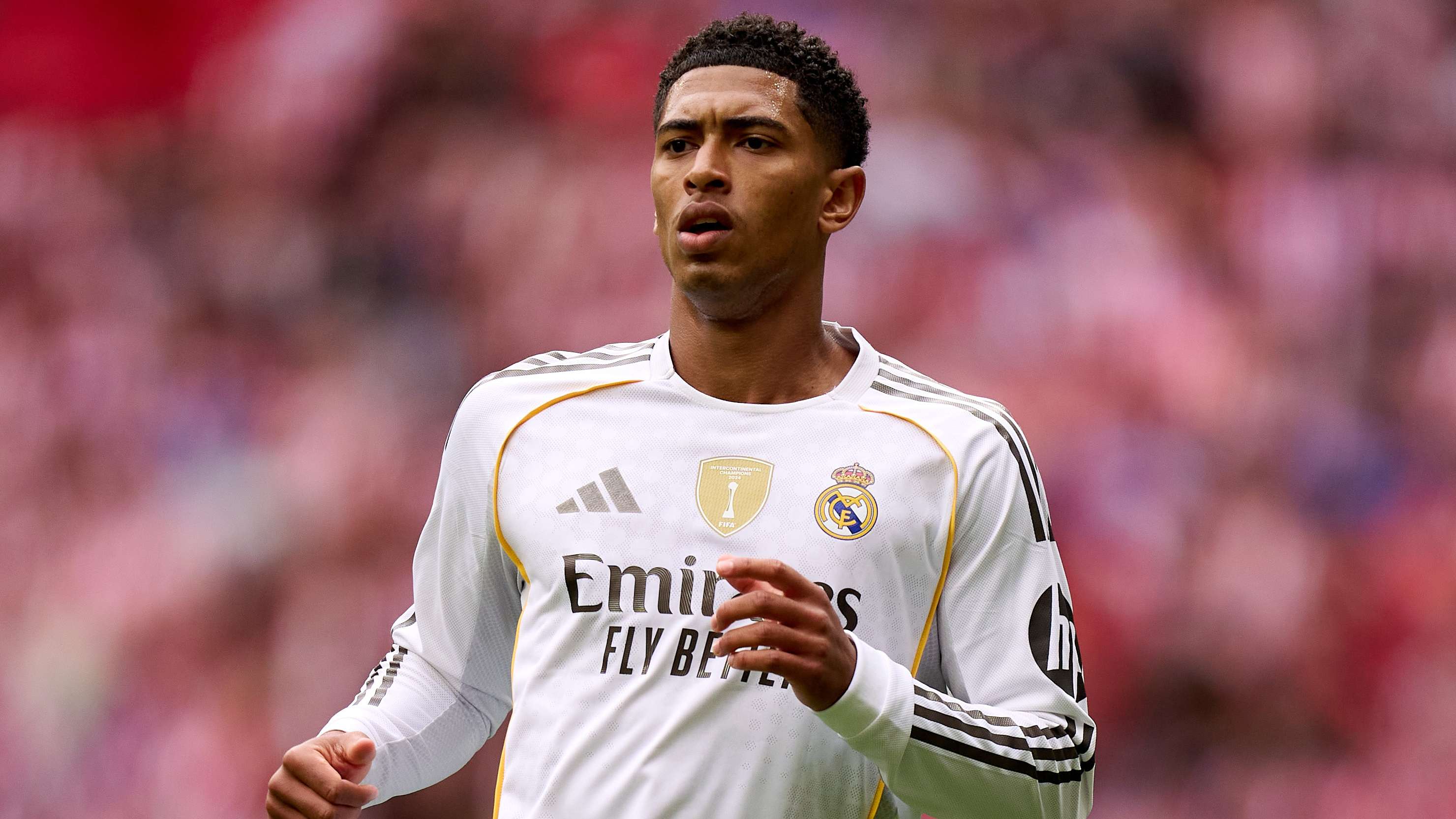
“I Tried to Maintain the Macho Athlete Image” – Jude Bellingham Opens Up on Self-Doubt and Mental Health Stigma
Real Madrid and England Star Explains Why He Stopped Reading Social Media Comments
It’s easy to look at Jude Bellingham and see only the brilliance — the superstar midfielder lighting up the Bernabéu, the golden boy of English football, the young man who seems to handle the weight of expectation as effortlessly as he glides past defenders. But beneath the confidence and charisma, Bellingham has revealed a more vulnerable side — one that few ever see.
In an honest and powerful interview as part of his work as a Laureus ambassador, the Real Madrid and England midfielder opened up about his struggles with self-doubt, his attempts to uphold the “macho athlete” image, and the toll of social media criticism on mental health.
At just 22 years old, Bellingham has already achieved more than most players dream of — yet, as he explained, the journey hasn’t always been as effortless as it looks from the outside.
Bellingham Opens Up on Mental Health Struggles and Stigma
For Bellingham, football isn’t just a sport — it’s a stage that magnifies everything. The highs are celebrated by millions, but the lows are dissected just as loudly. Speaking candidly about the pressures of being a modern athlete, he admitted that he’s not immune to moments of vulnerability, self-doubt, and emotional fatigue.
“With the development of social media and technology, there are more ways to attack someone, to make them feel bad,” he said. “And I think there’s still a stigma around talking about mental health. There have been times when I’ve felt vulnerable, doubted myself, and needed someone to talk to. But instead, I tried to maintain that macho athlete image — like I didn’t need anyone. The truth is, I do, just like everyone else.”
Bellingham’s words cut through the stereotype that athletes — especially men — must always appear unbreakable. He spoke about the dangerous illusion of invincibility that surrounds elite sport, and how it can prevent players from being honest about what they’re feeling.
“As athletes, it seems like we have the world at our feet: we can do whatever we want, make a lot of money, and never be affected by it,” he continued. “But if we’re able to show our vulnerability, it opens up a broader dialogue for people struggling in the dark. It’s our duty to be role models — not just for how we play, but for how we live.”
It’s a refreshingly open message from a player often portrayed as fiercely self-assured. Yet even for someone of Bellingham’s stature, the noise of modern football — from fan abuse to media scrutiny — can sometimes feel suffocating.
The Weight of Expectations in the Social Media Era
There’s no denying that social media has transformed the way fans interact with players. A decade ago, criticism might have been confined to pubs and living rooms. Now, it floods directly into an athlete’s phone within seconds of a game ending.
For Bellingham, that immediacy — and the constant stream of opinions — became impossible to ignore.
“When I was a young player in Birmingham, I used to type my name into Twitter and read everything that was said,” he admitted. “But even if the comments were positive, I quickly realised — why should I let the opinions of people who don’t know me validate what I think about myself?”
It’s a striking admission. Even praise, Bellingham found, could be addictive but damaging, creating a dependence on external approval.
“I believed I was a good player before reading it on Twitter, so what was the point of looking at what people were saying? And when the comments were negative, it would have the opposite effect. So again, I asked myself: why am I putting that weight on my mental health?”
For young players growing up in the spotlight — particularly prodigies like Bellingham, who broke into senior football at 16 — social media can be both a mirror and a magnifier, reflecting every opinion and amplifying every mistake.
By stepping away from it, Bellingham said he’s found clarity — and a healthier balance between confidence and criticism.

FBL-ESP-LIGA-ATLETICO MADRID-REAL MADRID
Balancing Authenticity and Pressure in the Digital Age
Still, Bellingham isn’t entirely dismissive of social media. He recognises its potential for good — as a tool for communication, inspiration, and connection between athletes and fans.
“There are aspects of social media that are valuable,” he said. “More and more people are interacting with it instead of press conferences or TV interviews. When you can be honest and authentic with fans, it gives them a clearer idea of how you felt during a match or in everyday life. It helps you become more relatable.”
But with openness comes risk. Bellingham knows how harsh the digital spotlight can be — how quickly admiration can turn to anger after a missed chance or a dip in form.
“There’s already enough negativity and pressure in professional sport,” he said. “Why go looking for more? Now, when I see negative comments, they don’t affect me the same way — but I still prefer not to see them at all.”
His view reflects a growing awareness among athletes — from Marcus Rashford to Naomi Osaka — that mental well-being is as vital as physical fitness. The difference, perhaps, is that Bellingham is part of a younger generation unafraid to challenge the old taboos.
“I think athletes are still expected to just ‘shut up and get on with it,’” he said. “That’s such an outdated view. For every fan who loves you, there’s another who despises you because of the team you play for. That hate can be very hard to handle, and I can empathise deeply with anyone who struggles with it.”
Why Jude Bellingham Stopped Reading Comments
At some point during his rise — from Birmingham City to Borussia Dortmund to Real Madrid — Bellingham realised that his peace of mind mattered more than public perception.
He stopped scrolling, stopped searching, and started focusing inward.
“It’s not that I don’t care what fans think,” he explained. “It’s that I can’t let it define me. When I’m playing, I’m already putting myself under pressure to perform for the team and for myself. I don’t need to add to that by reading every opinion online.”
That shift in perspective hasn’t dulled his competitive edge — if anything, it’s sharpened it. Without the external noise, Bellingham says he’s been able to focus purely on football — on what he can control, not what others say about him.
The Reality Behind the Superstar Persona
From the outside, Bellingham’s career looks near perfect. A Galáctico at 22, adored by Madridistas, trusted by Gareth Southgate, and already a leader for both club and country.
Yet, as he made clear, the journey has had its share of mental hurdles.
“Confidence is everything,” he said. “When you have it, you feel like you can handle anything. When you don’t, you feel lower than low — like your body isn’t working. It’s almost a paradox because confidence comes from performance, but you need confidence to perform.”
Bellingham, who recently returned from a shoulder surgery, knows that rebuilding rhythm takes time. He’s made five appearances since returning but was left out of England’s latest squad to focus on full recovery.
“I always try to keep my confidence high,” he said. “That might mean self-affirmation, or just accepting that I’m not going to complete every pass, beat every player, or score in every game. The more comfortable you are with not being perfect, the freer you become.”
It’s a level of emotional intelligence and maturity that belies his age — and perhaps explains why he’s so admired by teammates and coaches alike.
Breaking the “Macho Athlete” Myth
What makes Bellingham’s comments so important is not just what he said, but who said it.
For decades, footballers were expected to wear their toughness like armour — never showing weakness, never admitting doubt. To do so was to risk being labelled “soft” or “unfocused.”
Bellingham, however, is part of a new wave reshaping that narrative. He’s proof that strength and sensitivity aren’t opposites — they coexist.
“Everyone thinks confidence means never doubting yourself,” he said. “But confidence is actually being okay with imperfection. It’s being honest about who you are — good days and bad days.”
It’s a lesson not just for athletes, but for anyone living under the relentless gaze of public opinion.

Atletico de Madrid v Real Madrid CF – LaLiga EA Sports
Real Madrid Star Focused on the Future
Now back in the fold at Madrid, Bellingham’s focus is squarely on regaining form and fitness. Carlo Ancelotti’s side remain top of La Liga, and with crucial fixtures ahead — including Champions League nights under the Bernabéu lights — the Englishman’s return to rhythm couldn’t come at a better time.
But beyond football, it’s clear Bellingham’s ambitions go deeper than trophies. He wants to inspire conversation, to challenge outdated views, and to use his platform for something meaningful.
“If me talking about this helps one young player feel less alone, then it’s worth it,” he said.
In a sport that often glorifies perfection, Jude Bellingham’s vulnerability is a different kind of power — one that reminds us that even the brightest stars sometimes struggle to see their own light.












































There are no comments yet. Be the first to comment!